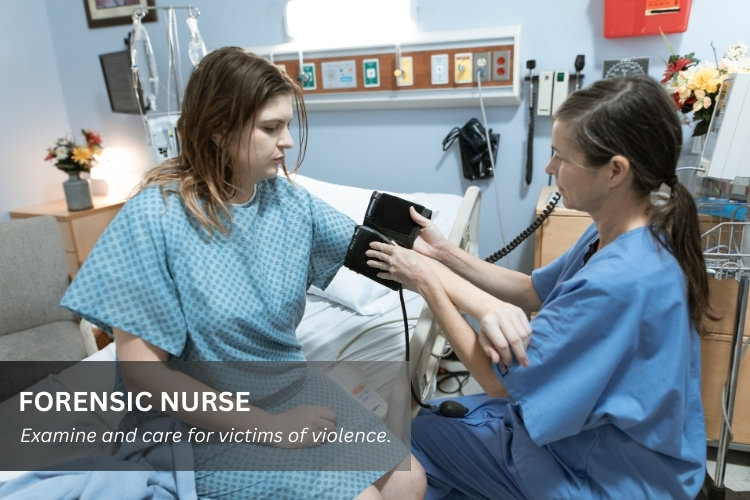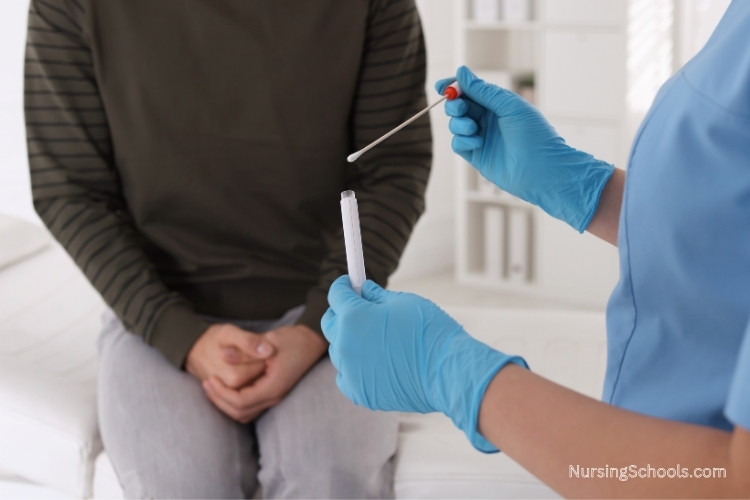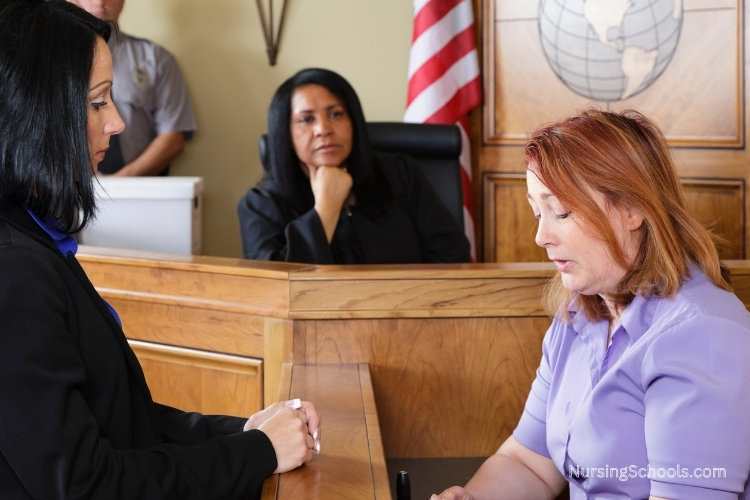Forensic Nurse
Healthcare Career Guide

Overview
What is a Forensic Nurse?
A Forensic Nurse is a specialized healthcare professional who provides medical care to patients while collecting and preserving evidence for legal cases. These nurses play a critical role in bridging the gap between healthcare and the criminal justice system. They often work with victims of violence, sexual assault, child abuse, and trauma, ensuring they receive proper medical attention while documenting forensic evidence.
Forensic Nurses collaborate with law enforcement, attorneys, and medical examiners to ensure evidence is properly handled and chain-of-custody procedures are followed. They may testify in court as expert witnesses and provide emotional support to victims of crimes. In addition to working in hospitals, they may be employed by government agencies, forensic labs, and advocacy organizations.
This career requires a unique combination of medical expertise, investigative skills, and compassion to support victims while ensuring justice is served.
Education
How Do I Become a Forensic Nurse?
Becoming a Forensic Nurse requires education, certification, clinical experience, and specialized forensic training. Follow these steps to enter this challenging and rewarding healthcare career:
- Earn a Nursing Degree. Complete an Associate Degree in Nursing (ADN) or Bachelor of Science in Nursing (BSN). A BSN is preferred for specialized roles in forensic nursing.
- Pass the NCLEX-RN. Obtain your nursing license by passing the National Council Licensure Examination for Registered Nurses (NCLEX-RN).
- Gain Clinical Experience. Work as a Registered Nurse (RN) in emergency rooms, trauma centers, or psychiatric units to develop strong assessment and crisis intervention skills.
- Complete Forensic Nursing Training. Enroll in a forensic nursing program, which includes coursework in forensic evidence collection, victim advocacy, and legal procedures.
- Obtain Certification. Earn the Sexual Assault Nurse Examiner (SANE) certification through the International Association of Forensic Nurses (IAFN) to demonstrate expertise in forensic nursing.
Becoming a Forensic Nurse typically takes 4-6 years, including nursing school, licensure, and forensic training. Certifications enhance credibility and career advancement opportunities in this field.

Average Salary
How Much Does a Forensic Nurse Make?
Salaries for Forensic Nurses vary based on location, experience, and certifications. On average, a Forensic Nurse can expect to earn between $70,000 and $100,000 annually.
Average annual salary for a Forensic Nurse:
- Entry-level: $70,000 - $80,000 per year.
- Mid-career: $80,000 - $90,000 per year.
- Experienced: $90,000 - $100,000 per year.
The U.S. Department of Labor reports that Forensic Nurses earn an average hourly wage of approximately $38.00 per hour. Assuming a 40-hour workweek, this equates to an annual salary of $79,040. The lowest 10% earn less than $32.00 per hour, while the highest 10% earn more than $46.00 per hour, resulting in an annual salary range of $66,560 to $95,680 per year.
Job Duties
What Does a Forensic Nurse Do?
Forensic Nurses provide specialized healthcare services while assisting in criminal investigations. Their responsibilities involve medical care, evidence collection, and patient advocacy.
The most common job duties of a Forensic Nurse:
- Conducting Forensic Examinations. Perform medical assessments and document injuries related to assault, abuse, or trauma.
- Collecting and Preserving Evidence. Gather biological samples, take photographs, and document patient statements to be used in legal proceedings.
- Providing Crisis Intervention. Offer emotional support and counseling to victims of sexual assault, domestic violence, and other traumatic events.
- Collaborating with Law Enforcement. Work with police, attorneys, and forensic scientists to ensure evidence is properly handled.
- Testifying in Court. Serve as an expert witness by presenting forensic evidence and medical findings in legal cases.
- Educating Patients and Families. Provide information about treatment options, legal rights, and community resources.
- Preventing Violence and Advocacy. Participate in public health initiatives aimed at preventing violence and supporting victim recovery.
- Advanced Duties. Experienced Forensic Nurses may develop forensic nursing protocols, train law enforcement officers, or work in specialized forensic units.
Forensic Nurses typically work in hospitals, forensic labs, correctional facilities, and legal agencies. Their job duties require a strong understanding of medical and legal procedures to ensure justice for victims.

Essential Skills
What Skills Does a Forensic Nurse Need?
Forensic Nurses need a combination of medical expertise, investigative skills, and the ability to provide emotional support to victims. These skills ensure they can perform forensic evaluations while advocating for patient rights.
Here are some of the skills a Forensic Nurse needs to succeed:
- Clinical Proficiency. Perform medical assessments, collect forensic evidence, and document injuries.
- Critical Thinking. Analyze patient conditions and legal evidence to support investigations.
- Communication. Effectively explain medical findings to patients, law enforcement, and legal teams.
- Attention to Detail. Ensure accurate documentation of injuries, patient statements, and evidence collection.
- Emotional Resilience. Handle the psychological challenges of working with victims of violent crimes.
- Legal Knowledge. Understand forensic procedures, chain of custody requirements, and court testimony protocols.
- Advocacy Skills. Support victims by providing medical care, counseling, and resources for recovery.
- Teamwork. Collaborate with law enforcement, attorneys, and medical professionals to ensure comprehensive care and legal accuracy.
One of the biggest challenges for Forensic Nurses is balancing their medical role with legal responsibilities. However, the rewards include helping victims find justice and improving forensic healthcare practices.
Last updated: March 2, 2025
References:
- Registered Nurses. Bureau of Labor Statistics, U.S. Department of Labor. Occupational Outlook Handbook. Retrieved March 2, 2025.
- Forensic Nurse. Johnson & Johnson, Nursing Careers. Retrieved March 2, 2025.
- Forensic Nurse Salary. ZipRecruiter, Career Profile. Retrieved March 2, 2025.
- Forensic Nurse Education and Certification. International Association of Forensic Nurses, Career Profile. Retrieved March 2, 2025.
- Forensic Nursing Certification. American Institute of Health Care Professionals. Retrieved March 2, 2025.
- Forensic Nurse How To Become One. Indeed, Career Guide. Retrieved March 2, 2025.
- Understanding Forensic Nursing. Xavier University, Career Guide. Retrieved March 2, 2025.


